英语(新标准)第十一册(顺序选修11)(供高中三年级下学期使用)(外研社)(Module 7)
三年级下册英语教案Unit 11 I‘m not we 北师大版一起

Unit 11 I’m not well.教案教学目标:1.通过对句型与单词的学习正确理解课文并能正确朗读。
2.通过本节课正确记忆身体各个部位的单词,并能描述某个部位受伤。
3.继续通过活动加深对What’s the matter……?等句型的理解。
4.理解字母w, y的发音。
5.通过练习复习身体各个部位单词教学重点:1.课文中出现的新单词及句型的意思与发音。
2.向对方问好及描述自己或他人身体情况句型的运用。
3.对What’s the matter……?等句型的理解。
4.How are you today? I’m no t well. My (ear) hurts.句型的运用。
身体各个部位单词的发音及意思。
教学难点:1.个别单词的发音,如drink, stomach, tongue……2.My stomach hurts和His stomach hurts的区别。
3.能正确判断字母w, y的发音。
4.How are you today? 区别第一人称和第三人称。
教学过程:1.情景引入(1)让学生讲一讲他们最近一次生病的情景。
问他们是否去看医生了。
问:“医生让你干什么?”试着引导学生说出Open your mouth对应的汉语。
(2)介绍单词mouth。
在黑板上画一个面部示意图,用箭头指向嘴,并写出单词mouth。
(3)朗读单词,让学生跟读。
(4)呈现表达法Open your mouth。
把句子写在黑板上,让学生跟读。
(5)问学生他们嘴里都有什么(teeth, tongue)。
介绍单词tongue,在画的脸部示意图上画出伸出的舌头,把单词tongue写在旁边,朗读并让学生跟读。
(6)问学生如果吃了过多的水果有什么感觉。
引导学生用汉语说出肚子痛。
(7)介绍单词stomach。
指着自己的肚子,说单词stomach,并写在黑板上。
朗读让学生跟读。
2.示范对话(1)问学生遇到朋友通常说什么。
引导说出How are you?相对应的汉语表达。
外研版高中英语选修11单词表

Unit 1tectonic adj. 地壳构造上的;起因于地壳运动的geological adj. 地质学的;地质的geology n. 地质学plateau n. 高地;高原backbone n. 脊椎;脊柱;主要山脉graze vi. 放牧;吃草strip n. 狭长的地域或水域carve vt. 雕刻;切开paddle vt. 用桨划(小船);(用桨划船)运送uninhabited adj. 无人居住的;杳无人迹的extinction n. 灭绝;绝种fern n. 蕨类植物scarce adj. 缺乏的;不足的warlike adj. 好战的;尚武的;善战的tribe n. 部落;部族wipe out 清除;垮台take over 接管;接收fence n. 栅栏;篱笆;围墙immuni ty n. 免疫性immune adj. 免疫的;免受(伤害)的treaty n. 条约;协议;协定representative n. 代表ownership n. 所有权;物主身份unrest n. 不安的状态;动乱civilian n. 平民fasten v t. 系牢;拴紧;使固定elastic adj. 有弹性的suspension n. 吊;县挂;悬浮appetite n. 食欲;胃口buffet n. 自助餐pasta n. 意大利面食(包括通心粉及面条等)porter n. 守门人;行李搬运工suite n. (宾馆中的)套房lounge n. 起居室;休息室laundry n. 洗衣店helicopter n. 直升飞机brunch n. 早午餐;晚早餐dairy n. 牛奶场;乳品店statist ics n. (pl) 统计;统计数字eco-friendly adj. 对生态环境友好的;不妨害生态环境的subtropical adj. 亚热带的fiord n. 峡湾;海湾not to mention 不必提及;更不用说recreation n. 娱乐;消遣raft n. 木筏;木排get around 到处走动hemisphere n. 半球schedule n. 时间表;进度表extensive adj. 广阔的;大量的;广泛的flexible adj. 灵活的;可通融的pace n. 速度;步调insurance n. 保险insure vt. & vi. (常与against连用)保险;确保theft n. 盗窃handy adj. 近便的;便利的;容易取得的consultant n. 顾问;咨询者guidance n. 指导;指引database n. 数据库;基本数据;资料库cater vi. & vt. 备办酒菜;承办酒席;提供食物(娱乐节目)cater for sb/sth 为某人提供;适合某人的需要enquiry n. (=inquiry)询问;探究extension n. (电话)分机;延伸;伸展vertical adj. 垂直的axis n. 轴;轴线Unit 2detect vt. 侦查;探测;检定jogger n. 跑步锻炼的人;慢跑者forensic adj. 法庭的;法医学的spray vt. 喷射;喷溅fingerprint n. 指纹;手印stain n. 污点;污处wrap vt. 包;裹bind vt. 缚;绑torso n. (人体的)驱干surgeon n. 外科医生X-ray vt. 照X光;照X射线abnormal adj. 不正常的;反常的;变态的emergency n. 紧急情况;紧急事件by law 根据法律jury n. 陪审团;评判委员会;陪审员imprisonment n. 关押;监禁assessment n. 评估;评价widow n. 寡妇compensate vt. 补偿;赔偿;酬报maximum n. & adj. 最大量(的);最大限度(的);极大(的)motive n. 动机;目的savagely adv. 野蛮地;残酷地ward n. 病房;病室lame adj. 跛的;瘸的thriller n. 惊险读物(电影)confidential adj. 机密的;秘密的ministry n. (政府的)部门funeral n. 葬礼;丧礼memorial n. 纪念物;纪念碑trend n. 趋势;趋向unemployment n. 失业;失业状态taxpayer n. 纳税人import vt. 输入;进口;引进aluminium n. 铝surplus adj. 过剩的;剩余的n. 剩余物;盈余flame n. 火焰greengrocer n. 蔬菜水果商greengrocer’s 蔬菜水果商店alley n. 小巷,胡同remark vi. & vt. 说;谈论;评论make of sth/sb 了解;理解candidate n. 应试者;候选人;候补者furnish vt. 陈设;布置expel vt. 开除;赶出allowance n. 津贴;补助every so often 偶尔;时常peculiar adj. 古怪的;奇特的;特殊的;罕见的Unit 3strategy n. 策略myth n. 神话;虚构的理念或故事harmony n. 和谐;融洽depressed adj. 沮丧的.well-balanced adj. 很平衡的;正常的;意识健全的prescription n. 药方;处方药cope vi. (妥善地)处理;对付;应付;克服cope with 应付;对付;克服let down 使失望; 辜负proportion n. 均衡;比例;比率fulfil vt. 满足;实现;达到effective adj. 有效的agenda n. 议程(表)interval adj. 间隔;间歇;幕间(工间)休息session n. 一段(活动的)时间contradictory adj. 矛盾的;同……相反的revise vt. 复查;(Brt) 复习curriculum n. 课程informal adj. 非正式的;非正规的deadline n. 最后时间;最后期限rigid adj. 刻板的;僵硬的;严格的subscribe vi. & vt. (常与to连用)同意;赞同post-graduate adj. 研究生的n. 研究生academy n. 高等专科院校;研究院;学术团体stead n. 替代;用处;好处stand sb in good stead 对某人很有用employer n. 雇主;老板diploma n. 文凭;毕业证书.Format n. 设计;安排glory vi. 自豪;得意glory in 以……为荣forgetful adj. 健忘的administration n. 管理;行政管理choir n. 合唱团postcode n. 邮政编码;邮编withdraw vi. & vt. 收回;撤回;sake n. 目的;利益for one’s own sake 为了……的缘故pursuit n. 寻求;追求pursue vt. 追求;寻求;不断努力以取得pedicab n. (人力)三轮车sleep rough 露宿feed on 从……中得到滋养或满足philosophical adj. 哲学上的socialism n. 社会主义receipt n. 接受;收到;收据;收条overweigh vt. 比……更重要; 胜过ensure vt. 确保;保证reproach n. 责备;责骂jealousy n. 妒忌;羡慕cease vt. 结束;停息;终止cease to be 不再是count up 把……加起来reinforce vt. 增强;补充Unit 4split vt. & vi. 分开;分离vliolate vt. 违犯;违反;破坏temporary adj. 暂时的;临时的;一时的statesman n. 政治家;国务活动家statesmanlike adj. 有政治家才干和风度的unconditional adj. 无条件的;无限制的;绝对的scar n. 疤;伤疤;创伤howl vt. 嚎叫;呼号;咆哮merciful adj. 仁慈的;宽大的;宽容的at t he crack of dawn 黎明;大清早quick as a flash 立刻;马上;一刹那hatch vt. 孵化;出壳whistle n. 口哨;哨子heel n. 脚后跟;踵a wolf in sheep’s clothing 披着羊皮的狼;伪装友好的敌人pint n. 品脱(=0.5夸脱;英制液量0.568升;美制液量0.473升)dead to the world 熟睡的;完全失去知觉的socket n. 孔;洞;眼窝stagger vi. 蹒跚;摇晃;踉跄agony n. 极度的痛苦belly n. 腹部wrestle vt. & vi. 与……搏斗;把……摔倒marble n. 大理石arch n. 拱门coarse adj. 粗糙的;鲁莽的pillow n. 枕头quilt n. 被褥;被子trough n. 饲料槽slice n. 片;薄片wear off 逐渐消失;磨灭;损耗saucer n. 茶托;茶杯碟;碟状物circus n. 马戏团;马戏表演freeway n. 高速公路plug n. 电插头;插销hydrogen n. 氢clay n. 黏土;泥土moustache n. 胡子mustard n. 芥末enlarge vt. 增大;扩大tournament n. 联赛;锦标赛;比赛fist n. 拳头co mbat n. 斗争;战斗;争斗walnut n. 核桃,胡桃transparent adj. 透明的;显然的;一目了然的transparently adv. 显然地;清楚地tug vi. & vt. 用力拉或拖(某物)dismay vt. 使沮丧;使灰心pulse n. 脉搏zoom vi. 飞驰;飞快地掠过zoom in on 推近;聚焦于insignificant adj. 无关紧要的;无用的fleece n. 羊毛Unit 5vice versa adv. 反之亦然(be) faced with 面临scholarship n. 奖学金in disbelief 不相信;怀疑drop into 偶然进入(某地);顺便拜访unsettling adj. 使人不安的;(消息)混乱的dozens of 许多的now and again 不时地;有时expectantly adv. 预期地;期望地;期待地suck vt. 吸;吮co-operate vi. (常与with连用)合作hand out 拿出来;分发preference n. 偏爱;优先选择pleasurable adj. 愉快的;快乐的;高兴的anticipation n. 预期;预想;期待intellectual adj. 智力的,有智力的arithmetic n. 算术学;算术algebra n. 代数;代数学interpersonal adj. 人际的;人与人之间的complex adj. 复杂的agro-scientific adj. 农业科学的core n. 中心;核心drop in 顺便走访recommendation n. 推荐信;介绍;介绍信call on 拜访composer n. 作曲家mathematician n. 数学家stewardess n. (轮船,飞机等)女乘务员diplomat n. 外交家;外交官embassy n. 使馆人员;大使馆referee n. 介绍人;裁判brake n. (常用复数)制动装置;刹车swerve vt. 突然转向;突然离开正路missile n. 导弹;飞弹circuit n. 环形道路go on-circuit 巡回razor n. 剃刀;剃须刀shaver n. 剃须刀;电动剃须刀oval adj. 卵形的;椭圆的orbit n. (天体、人造卫星的)轨道substance n. 物质curriculum vitae (CV) n. 履历;简历nickname n. 绰号;浑名presentational adj. 表达的;描述性的fabulous adj. 巨大的;绝妙;精彩IELTS abbr. International English Language Testing Ser vice国际英语测试,俗称雅思考试(是由英国文化委员会组织、剑桥大学地方考试委员会编制的英语水平测试)accountancy n. 会计工作;会计职务function n. 功能;作用;职责;职能bureaucratic adj. 官僚的;官僚般的ethos n. (集体、社团、文化的)气质、道德观、思想或信仰minefield n. 雷区;充满隐伏危险的事物或场合unwary adj. 无警惕的;易受欺骗的auto biography n. 自传build on 建立于prosperous adj. 成功的;繁荣的;兴旺的to tell you the truth 老实说(插入语)tempt vt. 诱惑;引诱appendix n. 附录;附言roundabout adj. 迂回的;委婉的。
10 英语(新标准)第十册(顺序选修10)(供高中三年级上学期使用)(外研社)(Module 2)
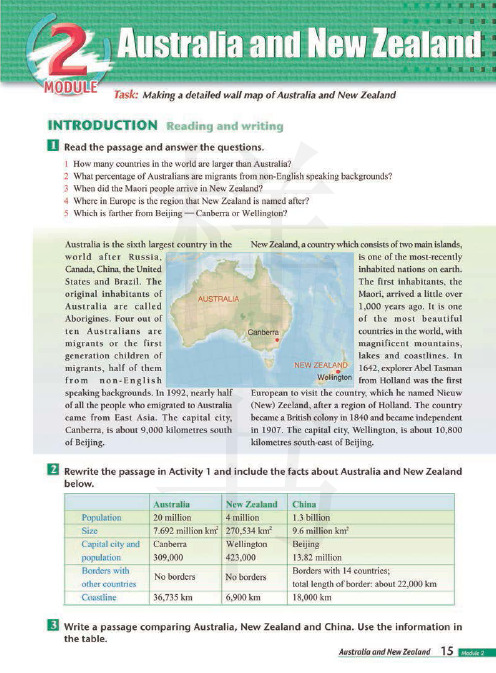
Au~tralia
Nc" Zuland Cbina
Population Sízc
20 million
4 miU ion
7.692 million km' 270,534 km'
1.3 billion 9.6 mill.ion km'
Capil31 city and Canberra
Wellinglon
became a Bririsb colony ìn 1840 and be四meindε,pendenr
in 1907. The 四pìtal city, Wellìngton, is about 10,800 kilomelres south-east of1leijing.
Rewrite the passage in Activity 1 and include the facts about Australia and New Zealand below.
•
∞untri臼 in lhe world, with
magnificent mountains,
时M川
N 础 u D lakes and coastlines. In -e 脚 伽 M 1M2, explorer Abel Tasman
&om HoLland w路由e frrst
speaking backgrounds. In 1992, nearly halC Europ臼n 10 visil lhe country, whídt he named Nìellw
样 2 Whatperc相tage ofAustralians are migrants from non-English speaking backgrounds?
高中英语新课程标准最新版笔记
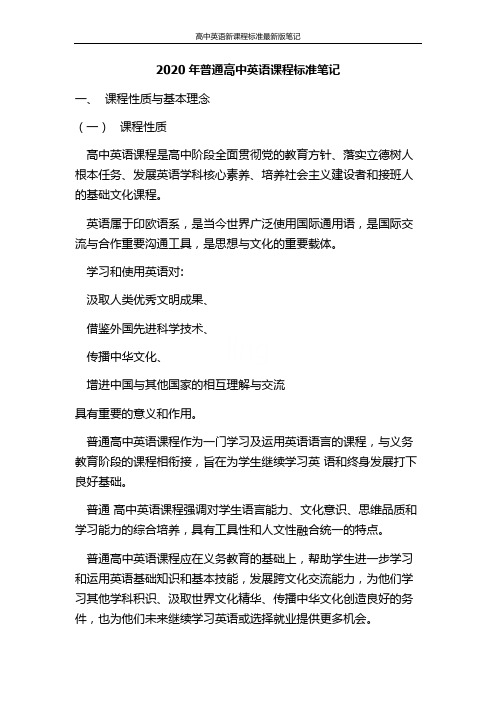
2020年普通高中英语课程标准笔记一、课程性质与基本理念(一)课程性质高中英语课程是高中阶段全面贯彻党的教育方针、落实立德树人根本任务、发展英语学科核心素养、培养社会主义建设者和接班人的基础文化课程。
英语属于印欧语系,是当今世界广泛使用国际通用语,是国际交流与合作重要沟通工具,是思想与文化的重要载体。
学习和使用英语对:汲取人类优秀文明成果、借鉴外国先进科学技术、传播中华文化、增进中国与其他国家的相互理解与交流具有重要的意义和作用。
普通高中英语课程作为一门学习及运用英语语言的课程,与义务教育阶段的课程相衔接,旨在为学生继续学习英语和终身发展打下良好基础。
普通高中英语课程强调对学生语言能力、文化意识、思维品质和学习能力的综合培养,具有工具性和人文性融合统一的特点。
普通高中英语课程应在义务教育的基础上,帮助学生进一步学习和运用英语基础知识和基本技能,发展跨文化交流能力,为他们学习其他学科积识、汲取世界文化精华、传播中华文化创造良好的务件,也为他们未来继续学习英语或选择就业提供更多机会。
普通高中英语课程同时还应帮助学生:树立人类命运共同体意识和多元文化意识,形成开放包容的态度,发展健康的审美情趣和良好的鉴赏能力,加深对祖国文化的理解,增强爱国情怀,坚定文化自信,树立正确的世界观、人生观和价值观,为学生未来参与知识创新和科技创新,更好地适应世界多极化、经济全球化和社会信息化奠定基础。
(二)基本理念1.发展学英语学科核心素养,落实立德树人根本任务。
2.构建高中英语共同基础,满足学生个性发展需求3.实践英语学习活动观,着力提高学生学用能力4.完善英语课程评价体系,促进核心素养有效形成5.重视现代信息技术应用,丰富英语课程学习资源二,学科核心素养与课程目标(一)学科核心素养学科核心素养是学科育人价值的集中体现,是学生通过学科学学习而逐步形成的正确价值观念、必备品格和关键能力。
英语学科核心素养包括语言能力、文化意识、思维品质和学习能力。
新标准英语第11册单词2020
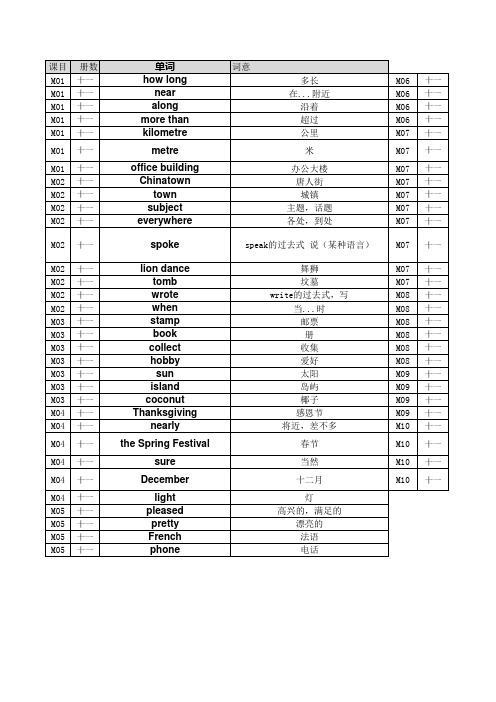
M07 十一 M07 十一 M07 十一 M07 十一 M07 十一
M07 十一
M07 十一 M07 十一 M08 十一 M08 十一 M08 十一 M08 十一 M08 十一 M08 十一 M09 十一 M09 十一 M09 十一 M09 十一 M10 十一
M10 十一
M10 十一
M10 十一
world difficult answer
Miss bamboo
gave
its almost
deaf frightened
sh
世界 困难的
回答 小姐 竹子 give的过去式 给,送 它的 几乎,差不多 聋的 害怕的 嘘,安静
roar
吼叫声
fox at night
coin ever tidy messy never blackboard peace make peace member state famous aunt
M04 十一
M04 十一
M04 十一
M04 十一 M05 十一 M05 十一 M05 十一 M05 十一
单词 how long
near along more than kilometre
metre
office building Chinatown town subject everywhere
spoke
forgot
way
cross
狐狸 在晚上
硬币 曾经 整理,收拾 凌乱的 从不 黑板 和平 维护和平 成员国 著名的 阿姨,姑姑,舅 母 忘记(forget的过 去式) 方式,方法 穿过(马路 等),渡过
课目 M01 M01 M01 M01 M01
册数
十一 十一 十一 十一 十一
外研版小学英语(新标准一起)三年级下册全册教案
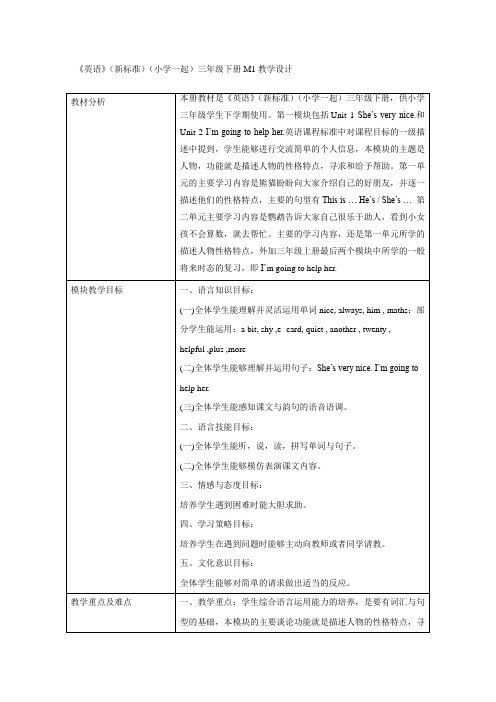
《英语》(新标准)(小学一起)三年级下册M1教学设计《英语》(新标准)(小学一起)三年级下册M2教学设计Module 2 教学设计家庭作业:1. 听录音,模仿跟读课文10分钟。
2.学唱歌曲The London Eye第三课时教学设计教材分析本模块是描述一座城市,一处景点或者是一件物品。
Unit 1 Amy向Lingling介绍了伦敦的泰晤士河、大本钟和伦敦眼。
Unit 2 的课文是Lingling通过读了伦敦的书之后,想去伦敦旅游。
Amy继续给她介绍了塔桥。
本节课主要对两个模块的学习内容加以复习巩固。
课时教学目标语言知识目标:一、全体学生能运用:It’s very long. You’ll see Tower Bridge二、全体学生能理解:about, river, wide ,old, clock, wheel, round,you’ll=you will, tower, bridge, will三、全体学生能运用:about, river, old, clock部分学生能运用:wide ,old, clock,wheel, ro und, you’ll=you will,tower, bridge, will语言技能目标:一、全体学生能听懂会说:It is very long. You'll seeTower Bridge.二、全体学生能认读:about, river, wide ,old, clock部分学生能认读:wide ,old, clock,wheel, round, you’ll=you will,tower, bridge, will三、全体学生能拼写3-4个自选单词教学重点与难点重点:一、运用wide ,old, clock,wheel, round, tower, bridge 来描述一处景点或者一件物品二.用will 来描述自己或者他人的行为难点:用will 来描述自己或者他人的行为《英语》(新标准)(小学一起)三年级下册M3教学设计(小学一起)三年级下册M4教学设计《英语》(新标准)(小学一起)三年级下册M5教学设计《英语》(新标准)(小学一起)三年级下册M6 教学设计课时教学案学校:青岛沧口学校情感态度能体会到英语学习的乐趣任务展示并介绍自己设计的怪物板书Module 6 Unit 1 Here are his hands. head headsarm armshand handsleg leagsfoot feet教学任务学生活动教师活动设计意图I.激趣引学,循标感知II. 活动导学,自主建标一、活动热身1.听一遍说唱,学习新单词。
高中牛津教材选修模块11课本全文
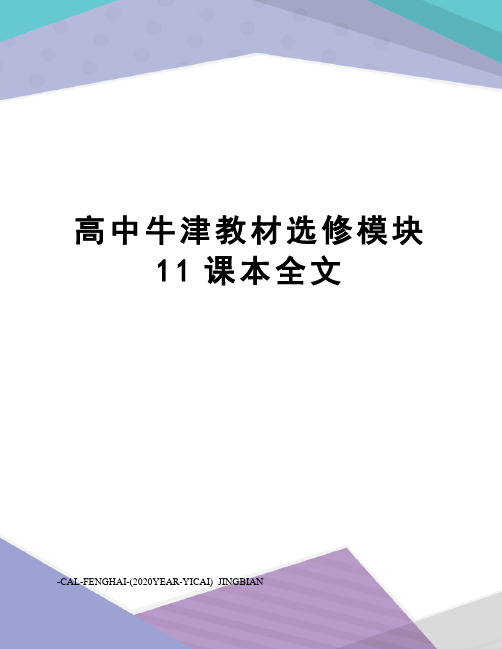
高中牛津教材选修模块11课本全文-CAL-FENGHAI-(2020YEAR-YICAI)_JINGBIANBookⅪUnit1 Careers and skillsReadingA.Read the article quickly and answer the following questions.1.What does the author discuss in the article?2.Can you give two examples of the so-called glamorous jobs?3.Which jobs look dull but are actually very important?B.Yang Min is thinking about her future career.She has found an article about jobs around the world in a teen magazine.Read the article with her.So many jobs to choose fromby Dai LinglingThe last year of high school is a time for hard work and also a time for reflection.At this time,you have to start thinking about the future and what ou want to do after graduation.In this article,I am going to discuss some of the options available to you and whether popular careers,more unusual jobs or everyday jobs better suited to you.When choosing a career,you should consider all the aspects of a job.Some jobs may seem very dull but are very important to society,while others can appear very exciting but are acting but are actually very difficult and boring.One example is the so-called ‘glamorous job’of beinga model or an actor.Would you like to be famous,wear diamonds,go to parties and relax on cushions in private jets or helicoptersIn reality,these people have to spend long hours travelling,with all their baggage packed in suitcases and trunks,and only a very small number of them are successful.Many actors,actresses and models hold ordinary,less glamorousjobs,often working as waiters and waitresses,in order to supportthemselves.Meanwhile,those who are successful and famous have to deal with constant media attention.They have to be very thick-skinned to deal with all kinds of criticism.They are also under huge pressure to appear young and beautiful.Most actors and models are always on a diet,and many have painful surgery to make their faces and bodies look more attractive.It does not seem that glamorous now,does itMaybe a career as a local grocer of flour-covered baker would be a better option. Other popular professions for young people include careers in law or business.Many people have ambitions to become successful as a lawyer or business person,but they do not consider the stress and pressure that come with these jobs.These can be well-paid and interesting jobs,but you also have to work very long hours.Also,sometimes as a boss in the business world,you have to make difficult decisions that hurt people,and being a lawyer can involve facing tough moral issues.In contrast,some people find more unusual jobs that are better suited to their talents and interests.A few years ago,when I was hiking in the Grand Canyon National Park in the USA,I met a man who had a very unusal job.He was living by a steam in a tent surrounded by technical equipment,and his only neighbours were the birds and squirrels in the nearby trees.His job was to check noise pollution in the park zones.He loved camping,and his job was like a holiday for him.It was very easy to see that he enjoyed doing his job.There are many other people doing unusul jobs,such as a beer taster at a brewery,who probably consumes one litre of beer per year,a person who designs fireworks displays and a person who tests rides for amusement parks.All these people love their jobs,which might not be popular,but are interesting regardless.Similarly,many ordinary jobs may look dull,but they are as essential as water to our society.As we go through our daily lives,we meet many different kinds of people-shop assistants,who sell us things in shops;drivers,who drive trams andd buses transporting us around the city;babers,who cut our hair in babershops,and cleaners,who clear up our rubbish.These jobs may not seem very attractive,but they are all important.For example,if no one was to collect the rubbish,the steets would soon become very dirty and unpleasant,the number of rats would increase,and disease would spread.These people,who perform such ordinary but vital tasks,allow people to go about their daily lives.When you think about your future career,remember that some glamorous jobs can be rather difficult and that some ordinary jobs can be quite important.All of them together,through,help society function.Reading strategy:reading for opinion in a textAlmost very article reflects the opinions or views of its author.In many cases,articles are aimed at persuading people or expressing personal view,such as those in a newspaper column.In the text above,the author uses quite negative languages to desvribe some vareers,e.g.‘It does not seem that glamorous now,does it’and very positive language to descri be some others,e.g.‘These jobs may not seem very attractive,but they are all important’.It is clear that the author is biased in favour of ordinary careers and dislikes some popular careers.any article is biased to some extent,so when looking at an article,readers should pay attention to what kind of language is used to discuss different things,find out the author's opinions,think caredully and decide whether they agree or not.Project Writing an essay about careersWhen choosing a career,it can be helpful to ask yourself questions about your interests and skills to help you decide what jobs would be most suitable for you. A.The following is an Internet quiz.It identifies your skills and interests,and gives you score to help you evaluate different career plete the quiz.What is your ideal job?Read each item and circle the one/ones which describes/describe what you think or like to do.For each item,you can choose more than one answer.There are no right or wrong anwers.1.I would rather_____a fix or mend thingsb solve maths problemsc draw or paintd lead a group discussione sell things or promote ideasf set up systems on a computer2.I am______a practicalb curious about many thingsc creatived friendlye self-confidentf well organized3.For a hobby,I prefer______a playing sportb reading booksc taking photographsd watching sporte being in a debating societyf collecting things4.I like to_____a build thingsb do lab experimentsc design thingsd play team sportse meet important and famous peoplef organize things5.I can______a operate tools and machines easilyb use a computer easilyc sing,act or dance weilld work well with otherse give good speechesf keep accurate records6.I like to______a be around animalsb solve problemsc use my imaginationd work with people to help theme work with people to make moneyf work with dataNow look at your answer and figure out how many times you have chosen. a=___ b=___ c=___ d=___ e=___ f=___The letters represent different tyes of people.Find the letter which you chose the most often and look at the description which corresponds with it below.This will tell you what type of person you are and what careers would probably suit you best.If there was no one letter clearly chosen most,look at the two most frequently chosen.Realistic(The doers)These people have practical or athletic abilities and prefer to work with objects,machines,plants and animals or to be outdoors. Suitable jobs include: bus driver, butcher, carpenter, chef, electrician, firefighter, jeweller, machine operator, plumber, sailor and tailor.Investigative(The thinkers)These people like to observe, learn, analyse, evaluate and solve problems. Suitable jobs incluade: biochemist, biologist, chemist, dentist, engineer, geologist, mathematician and software engineer.Artistic(The creators)These people have artistic,freethinking or intuitive abilities and like to work in free and open situations (without regular office hours) using their imagination and creativity.Suitable jobsinclude:actor,architect,dancer,designer,hairdresser,fashion designer, photographer, theatre studies/ music/language teacher and writer.Social(The helpers)These people like to work with people educate,inform,help,train or cure them.Suitable jobs include:librarian,nurse,police officer,flight attendant,teacher,therapist and trainer.Enterprising(The leaders)These people take great pleasure ininfluencing,persuading,performing,leading or managing an organization's successes.Suitable jobs include:computer operator,financial manager,hotel manager,journalist,lawyer,saleperson,shopkeeper,travel agent and the premier of a country.Conventional(The organizers)These people are talented at administration,like to work with daba and can carry out tasks in detail or follow other people's instructions.Suitable jobs include:accountant,cashier,clerk,customs inspector,secretary and telephone operator.B.You are going to write an essay about what career you want to have and how accurate you think the quiz is and why.Answer these questions to help you write your essay.1.What ideas did you have about your career before you did the quiz?2.What did you think about the quiz?3.How did you feel about the result you got?4.Do you think a person could be a mixture of more than one typeWhy5.How accurate do you think the quiz wasWhy6.What else can you do to find out the most suitable career for you?7.Do you need advice from your teachers,parents and friendsWhy or Why not8.How will you organize and plan the information in your essay?Unit2 Getting a jobReadingA.Read the following lecture transcript quickly and answer the following questions.1.What is the lecture transcript about?2.How many parts does the interview process have?3.What should you do to increase your chances of success in an interview?B.A professor is giving advice on how to succeed in an interview.Read the transcript below and find out how to improve your performance in a job interview.Tips for job interview successGood morning,everyone.Today,I'll be talking about how to get the job you really want.We're going to look at what you should do if your application is successful and what to do if you're asked to go for an interview.Before we go an further,it's important to make sure you understand what an interview is and why it's arranged.An interview is a talk between an employer and a potential employee.It's set up so that the interviewer can assess the interviewee and see if he or she is suitable for theposition.However,this is not an interview's only puipose.It also provides an opportunity for the job candidates to find out more about the job and company,and to ask themselves,‘Is it right for me’When we look at the interview process,we can split it into threeparts:first,preparation;second,the interview itself;and finally,what youshould do after the interview.Let's look at the first part-reparation.This is the key to getting the job you want,even if you're just applying for a position as a typist.Find out as much as you can about the company.Most companies have a website that tells you most things you need to know.A good interviewer is able to tell very quickly if you've done your homework about the company,so make sure you have!Next,think about what they are going to ask you.Think about some of the questions you might be asked and how to best answer them.Or better yet,do practice interviews with a friend.This allows you to prepare good answers and means you won't have to answer questions off the top of your head during the interview.So now I want you to imagine that it's the day of the interview.Don't worry about the having butterflies in your stomach before the interview.If you've prepared properly,you'll feel confident.It's not like a painful trip to the dentist,so there's no need to quake with fear.An interview is just a conversation between people,but first impressions are important,so gentlemen,make sure you've used your electric shaver or razor to give yourself a good shave that morning.Both men and women could put some styling wax in their hair,and women can put some hairpins in theirs to keep their hair neat and tidy.It's also very important that you wear smart clothes that make you feel confident.Your interview might last for thirty minutes or more,but the interviewer will begin to judge you as soon as he or she sees you.Wearing a pair of shorts and a vest is definitely not acceptable when you're going for an interview!When you arrive for your interview,make sure you are on time,or even a little bit early.Arriving late for an interview is one of the worst things you can do.The interviewr will not listen to your explanation about how had the traffic was at the roundabout;there's never a good excuse for beinglate.Ever.You should also use body language to express yourself.Nod your head when you agree with something or wag your head when you don't.Keep your back straight and don't move around too much.Otherwise,the interview might think that you're nervous or uncomfortable.Listen closely to the questions the interviewer asks and answer them carefully.And don't forget that an interview is a chance for you to learn more about the job,the company and the people who work there.Asking questions will show that you're interested in the job.We're almost finished now,but don't think that there's nothing else you can do once the interview is over.You should follow it up by writing to the company and thanking them for giving you the interview.This is not only a gesture o politeness,but also a final chance to sell yourself to the company.It can also give you the edge over other candidates,so remember to check your spelling,punctuation and grammar.If you follow the advice I've given you today,landing an interview should be as easy as pie.I wish you all the best in getting the job you want.Good luck!Reading strategy:understanding incomplete sentences used for emphasis Incomplete sentences are those sentences missing a subject (noun),a predicate (verb) or both,as is the case when a sentence begins with a conjunction like and,or,so and but.In general,incomplete sentences are to be avoided because they are grammatically incorrect.However,sometimes an incomplete sentence can be used in a passage to emphasize an important point,e.g.‘Or better yet,do practice interviews with a friend.’The transition to an incomplete sentence is not a smooth one,and this also helps bring readers' attention to it:‘So how I want you to imagine that it's the day of the interview.’Recognizing incomplete sentences can help us identify the important points of a passage,as well as the organization of it as a whole.Project Planning a gap yearMost young people who want to go university will go as soon as they graduate from high school,but it this the best thing to doIf you had the chance to take a year off between leaving school and going to university,would you do itDo you think this would help you get a better job once you finished your studiesA.Read the following magazine article about British students who take a gap year.It will help you prepare for your project.Mind the gapTraditionally,a student leaving school at eighteen would go straight to university and study for three or four years before joining the world of work and beginning the slow climb up the career ladder.However,this year,like last year and the year before,thousands of young people will travel to every point of the compass and work on projects for up to a year before returning to the UK to enter university.They could work as an English teacher in Vietnam or perhaps even work in a nature reserveprotecting kangaroos in Australia or zebras in Africa.In fact,these young people can now be found nearly everywhere in the world except the Antarctic.This year off between finishing school and starting university is known as a gap year.It is more then just a long holiday.The British government is now providing funds to some young people to help them take a gap year. Unitversities actively encourage students to take a year off before entering university,and more and more employers say they prefer to hire graduates who have taken a gap year rather than those who stay in the education system and go straight from school to university.The reason for this preference is simple.A gap year gives young people an opportunity to learn skills and gain life experience,which school or university cannot provide.It helps young people develop and grow.Last year,Carol Smith went from the UK to Brazil,where she worked on a project to help save the Amazon rainforest.She said,‘My friends always thought I was too delicate,but living away from home in such a remote place taught me to be more independent.Of course,I missed home and only got letters through airmail,but I'd definitely recommend it,I feel like I really made a difference and helped conserve the rainforest.’Another student who chose to take a gap year,Daniel Jones,spent one year teaching in Ghana before retuning to the UK.He taught English and maths to poor students from rural areas.He found living among local people there to be challenging but rewarding.‘Fa milies there are so poor that they didn't even have basic things like refrigerators or kettles.In fact,they didn't have any electricity.At night,we couldn't just hit a light switch;we had to use a flashlight or an old oil lantern to give us some light.After living in such conditions,now I feel I'm ready to face challenges in the future.’Martin Johnson is from the UK and helped build a school in a poor part of India.He said he wanted to learn how to deal with difficult situations. Explaining how they made most of the school's furniture,he said,‘We had some wood,nails,hammers,a few spades and a lot of hard-working people.’Martin said he had learnt a lot by working with the local people,‘I helped people harvest their crops before they rotted,which was something I had never done before.It was very special,being part of another culture.’For many students,a gap year teaches them how to work with a group of strangers and how to look after themselves without the help of family or friends.These are exactly the sort of skills employers are looking for. Nowadays,they expect young people to have more than just academic qualifications.Mr Biggins,the CEO of a major finance company,welcomes the extra experience that a gap year can bring to graduate trainees.‘We usually find that sutdent who have been on a gap year are more capable of working independently,and they tend to work better with colleagues from different backgrounds.’It is now widely accepted that a gap year is more than just a year away from studying.It is a time for personal growth and development,learningnew skills and seeing life in a different way.When students start university,they are enthusiastic and very motivated.As well as having a good time and making new friends,doing a gap year may give students an edge in the job market.B.Your group is now going to talk about the benefits of a gap year.You are then going to write an essay about what you think of going on a gap year,where you would go and what you would do.The questions below will help you prepare for this essay.1.Do you think taking a gap year is a good ideaWhy or why not2.Do you think there are any negative aspects to taking a gap yearIfso,what are they3.If you could go on a gap year,would you do it?4.What would you need to do to prapare for a gap year?5.What sort of help would you needWhere would you find this help6.Where would you like to goWhy7.What sort of project would you like to doWhy8.Do you think this would have a positive effect on your future careerWhy or why notUnit3 The secret of successReadingA.Read the radio transcript quickly and answer the following questions1.When was Clive Sinclair born?2.What was Clive's first job?3.What socitey was Clive chairman of?B.Li Cheng is doing a project about the secret of success.Read the transcript of a radio programme he has heard about a succeccful person.Sir Clive Sinclair-----the man who brought technology to the man in streetToday's programme is about Sir Clive Sinclair,the famous British businessman and inventor.Sinclair was born in Surrey,England,on 30 July 1940.He spent much of his childhood with his grandfather and father,who were both engineers.As a result,he began designing and making things when he was very young.As a child,Sinclair invented the calculator and was saddened to discover that it had alrealdy been invented.Sinlair was blessed with brains and spent much of his time educating himself.By the time he was ten years old,his teachers said that he was already so good at geometry,algebra and arithmetic that they could not teach him any more maths.He studied at several high schools and colleges and eventually decided that university would teach him nothing new.Therefore,at the age of 17,he got a job as an assistant editor for a magazine called Practical Wireless.In 1961,Sinclair registered his own company,which was going to produce pocket-sized radios.Unfortunately,his financial parter withdrew and the company folded,so Sinclair quickly found himself a job as a technical editor to support himself.A year later,he restarted his company that had earlier folded.Sinclair's big picture was to produce in bulk and to sell cheaply so that everyone coud afford electronic goods.As soon as he advertised,the company was fooded with demands for the little,cubic-shaped radios.The pocket-sized radios are just one example that shows how talented Sinclair was at making little things.He also launched the world's first pocket calculator in 1962,the first digital watch in 1976 and the first pocket TV the following year.A new years later,in January 1980,Sinclair showed off the ZX80 computer at a booth in an exhibition at Wembley Stadium.The computer cost less than £100.Before this,only one company had launched a home computer at £700 each,which was very expensive at that time.By the end of eight months,Sinclair had sold more than 20,000 ZX80 computers,making ti a real hit.The company expanded rapidly,and he even had to open a new centre in the USA to cope with the increased demand.Sinclair then intorduced the ZX Spectrum computer in1982.Although marketed as a computer that could be used to help computer programming,the main advantage of this computer was that it was good for playing computer games on.During the 1980s,Sinclair first studied Economics at Cambridge University and then taught Electronic Engineering at differentuniversities.However,during that time,his career underwent a downward slide after he launched the Sinclair C5 car.This small three-wheeled,battery-powered car did not need a tank filled with gallons of petrol for energy likemost vehicles,and so ti was better for the environment.Unfortunately,it looked a bit unusual,being very small and having a strange ovalfront.Sinclair's new invention was laughed at in the newspaper,and it was shown in pictures next t o a caption calling it a ‘washing machine on wheels’.Sinclair's reputation suffered as a result,but he is still respected for his earlier success.Sinclair has been an inventor and a businessman,and he was also chairman of British Mensa (the High IQ Society) from 1980 to 1997.Mensa is a society for bright people,and it aims to create a platform for these people to share their thoughts and ideas.When Sinclair joined in 1959,menbership was falling,and the socitey was on its last legs.Sinclair uesed his fame to make Mensa an organization people respected and wanted to join.He advertised widely and personally paid for an annual Mensa conference at Cambridge.Mensa's membership figures boomed under his leadership.His leadership skills and strength of personality made the society an incredibly well-known organization.Sinclair has been successful because he possessed a combination of intelligence and determination that allowed him to realize his dream of making electronic goods available to everyone.He was honoured in 1983 with a knighthood from the Queen of England in recognition of his efforts and achievements.Sinclair has had a full and interesting life,and I hope that you have enjoyed his story in today's programme.Reading strategy:understanding sub-topicsWhen reading an article or an essay,it is important to realize that the text focuses on one main topic on theme.However,within the text,there are usually many different paragraphs in which sub-topics are explored.These sub-topics relate to the main topic,but each focuses on one specific idea.Each sub-topic is supported by examples such as facts,figures,dates and reasons.The main topicof the article is Sir Clive Sinclair's life and inventions.The sub-topics deal with different aspects of this main topic.For exam ple,the third paragraph of this text has the topic sentence‘Clive was very talented at making little things’,and it is supported by examples of his invention of miniature things:pocket calculator,digital watch and pocket TV.We sometimes do not realize what a sub-topic is until we read the supporting example.Project Writing and making a speechBeing a successful individual does not just mean you have achieved fame and fortune.You do not have to be rich or famous to be successful.There are many successful people in the world who have achieved a different kind of success.A.Read the following transcript of a speech which came first at a Fahter's Day Speech Competition.It will help you when you prepare your speech about a successful person you admire.My father,my heroI consider my father to be the most important person in my life.This is not because he is famous or wealthy.We do not have a big car,and there are no old,expensive vases or paintings in our house.Rather,what I value about my father is the care and love the shows for me and my family.What makes my father happy is being able to put a loaf of bread on the table,bedding and quilts on our beds and roof over our heads.My father might work hard,but he is always there for us.Whenever I trip on the mat or carpet or hurt myself playing sports,he's there to pick me up.My brother and I grew up with his constant care and the funny nursery rhymes and stories he told us.My father's family came ti the USA from China,and they were quite poor when he was a child.He once told me his mom used pins to hold his shirt together when he went to school.When he was only fourteen years old,he had to leave school and start working because my grandfather died,leaving no money and a big family behind.If he had not worked,there would have been no one to support the family.When my mother and father got married,they did not have much money.The situation got worse when they had children.When we were very young,my father had an extra job as a porter,and he also mopped the floor of a hotel every night so that he could give us a special treat or a vacation.At the start of last year,my father began putting at least fifty cents every day into a jar on a shelf in his bedroom.We all wondered what he was saving the money for,but the refused to tell us.Then,in December,I noticed that the jar was empty.That evening,my father came home with some great Christmas present,including candy,balloons and a huge hen for our Christmas presents,including candy,balloons and a huge hen for our Christmas dinner.It was the best Christmas ever.My father also helps our local community.As chairman of the community center,he has set up a committee to help elderly people in the area.This committee arranges for people to cook healthy food like bean curd and。
外研版小学英语三年级下册单词默写表

外研社小学英语三年级下册单词默写表Module 1-4(一年级起点)一、英译汉Module 1songcolourTVHere you arefavouriteModule 2theyelephantthey’re = they arefatmonkeymanbabyshortalltallzoosmallthinlionbigModule 3likeouchfootball basketballthemtable tennis morning exercises swimrideskipbikeModule 4meatmmpassriceorangemumapplenoodlesbananafishpearbutdoesn’t = does notmilk二、汉译英Module 1友好的,亲切的;讨人喜欢的___________________ 总是,一直___________________稍微,有点儿___________________羞怯的,胆怯的,腼腆的___________________电子贺卡___________________文静的___________________另一个,再一个___________________(宾格)他___________________鹦鹉___________________二十___________________肯帮忙的;有用的___________________数学;数学课___________________加,加上___________________更多的;另外的;附加的___________________Module 2关于___________________河___________________宽的,宽阔的;宽广的___________________ 年代久的,古老的___________________钟,时钟___________________轮子___________________圆形的;球形的___________________将,将会___________________你将___________________塔___________________桥___________________Module 3将不___________________农村,乡下___________________农民;农场主___________________在那里___________________许多的,大量的___________________早餐___________________吃早餐___________________茶;茶叶___________________(下午的)茶会,茶话会___________________Module 4采,摘(花、水果)___________________十四___________________十六___________________十八___________________十三___________________十五___________________十七___________________十九___________________担心的___________________感觉;觉得___________________号,行___________________Module 5明天___________________星期一___________________为什么___________________为什么不呢?___________________星期ニ___________________星期三___________________星期四___________________下ー个的;其次的___________________ 周,星期___________________Module 6跺脚,用力踩___________________计算机,电脑___________________该,要___________________胳膊___________________Module 7班级___________________一些,若干;任何一个___________________ 问;询问;打听___________________问题___________________四十___________________因此___________________大约___________________三十___________________Module 8努力地___________________懒惰的,懒散的___________________母亲;父亲___________________家长日___________________谈话;说___________________对于___________________很,非常___________________擅长___________________英语;英语课___________________体育;体育课___________________汉语,中文;语文课___________________ 美术;艺术;美术课___________________ 成绩报告单___________________尝试,试图___________________Module 9(are的过去式)是___________________年轻的___________________漂亮的,美丽的___________________(is的过去式)是___________________也,还___________________那时___________________谁___________________(外)祖父;(外)祖母___________________ 老的,年老的___________________昨天___________________Module 10第二___________________层___________________担忧的;焦虑的___________________发现,找到___________________第一___________________记起;回想起___________________母亲节___________________蔬菜___________________上ー个___________________。
北师大版高中英语选修十一高三年级综合测试
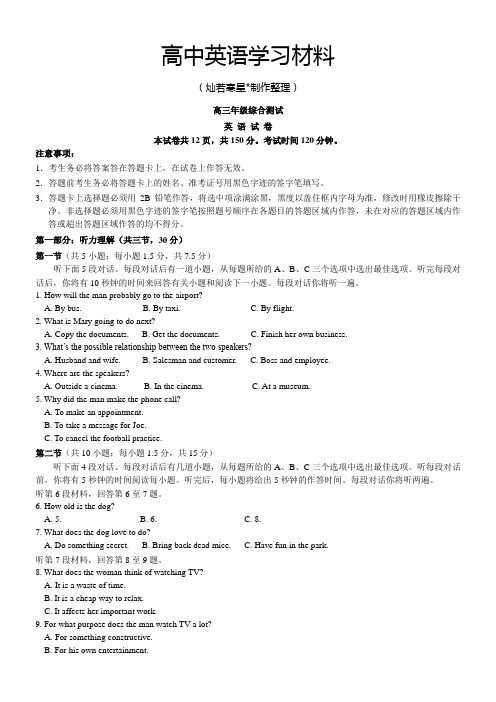
高中英语学习材料(灿若寒星*制作整理)高三年级综合测试英语试卷本试卷共12页,共150分。
考试时间120分钟。
注意事项:1.考生务必将答案答在答题卡上,在试卷上作答无效。
2.答题前考生务必将答题卡上的姓名、准考证号用黑色字迹的签字笔填写。
3.答题卡上选择题必须用2B铅笔作答,将选中项涂满涂黑,黑度以盖住框内字母为准,修改时用橡皮擦除干净。
非选择题必须用黑色字迹的签字笔按照题号顺序在各题目的答题区域内作答,未在对应的答题区域内作答或超出答题区域作答的均不得分。
第一部分:听力理解(共三节,30分)第一节(共5小题;每小题1.5分,共7.5分)听下面5段对话。
每段对话后有一道小题,从每题所给的A、B、C三个选项中选出最佳选项。
听完每段对话后,你将有10秒钟的时间来回答有关小题和阅读下一小题。
每段对话你将听一遍。
1. How will the man probably go to the airport?A. By bus.B. By taxi.C. By flight.2. What is Mary going to do next?A. Copy the documents.B. Get the documents.C. Finish her own business.3. What’s the possible relationship between the two speakers?A. Husband and wife.B. Salesman and customer.C. Boss and employee.4. Where are the speakers?A. Outside a cinema.B. In the cinema.C. At a museum.5. Why did the man make the phone call?A. To make an appointment.B. To take a message for Joe.C. To cancel the football practice.第二节(共10小题;每小题1.5分,共15分)听下面4段对话。
三年级英语下册外研版Module11.doc
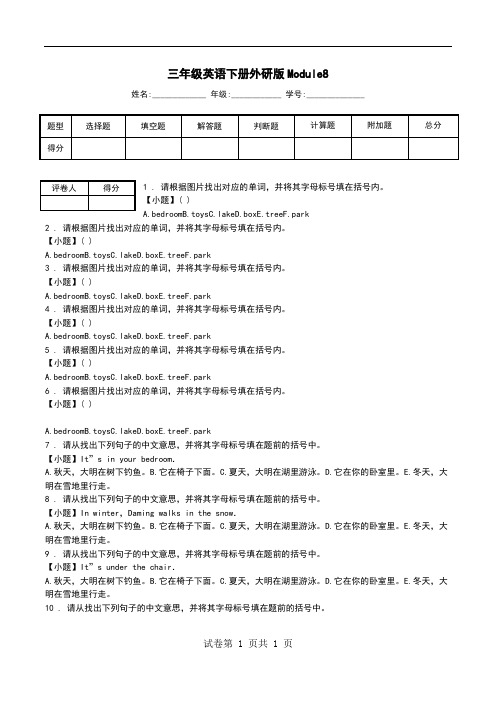
三年级英语下册外研版Module8姓名:_____________ 年级:____________ 学号:______________1 . 请根据图片找出对应的单词,并将其字母标号填在括号内。
【小题】( )A.bedroomB.toyskeD.boxE.treeF.park2 . 请根据图片找出对应的单词,并将其字母标号填在括号内。
【小题】( )A.bedroomB.toyskeD.boxE.treeF.park3 . 请根据图片找出对应的单词,并将其字母标号填在括号内。
【小题】( )A.bedroomB.toyskeD.boxE.treeF.park4 . 请根据图片找出对应的单词,并将其字母标号填在括号内。
【小题】( )A.bedroomB.toyskeD.boxE.treeF.park5 . 请根据图片找出对应的单词,并将其字母标号填在括号内。
【小题】( )A.bedroomB.toyskeD.boxE.treeF.park6 . 请根据图片找出对应的单词,并将其字母标号填在括号内。
【小题】( )A.bedroomB.toyskeD.boxE.treeF.park7 . 请从找出下列句子的中文意思,并将其字母标号填在题前的括号中。
【小题】It”s in your bedroom.A.秋天,大明在树下钓鱼。
B.它在椅子下面。
C.夏天,大明在湖里游泳。
D.它在你的卧室里。
E.冬天,大明在雪地里行走。
8 . 请从找出下列句子的中文意思,并将其字母标号填在题前的括号中。
【小题】In winter,Daming walks in the snow.A.秋天,大明在树下钓鱼。
B.它在椅子下面。
C.夏天,大明在湖里游泳。
D.它在你的卧室里。
E.冬天,大明在雪地里行走。
9 . 请从找出下列句子的中文意思,并将其字母标号填在题前的括号中。
【小题】It”s under the chair.A.秋天,大明在树下钓鱼。
10 英语(新标准)第十册(顺序选修10)(供高中三年级上学期使用)(外研社)(Module 4)
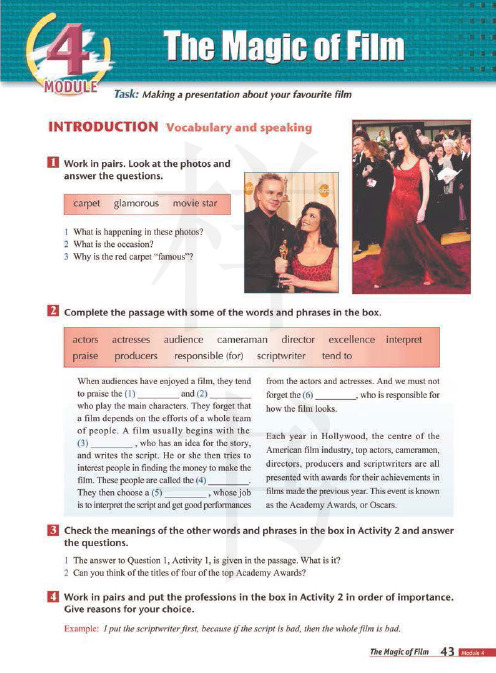
millioo people from all over the world 阳mon
is about $250, however, tbeir symbolic 吨Jue is
lheir televisions.
fargr回 te仁
(e) Howcver, glamorous lhough lhe Oscars are,
I For several hours al leasl, Ihey watch a large 6 Comedi饵 , 110 matter how good tI,ey a时• ray,吟'
, gatheril g ofexll酬吵 glamorous people ...w1l prizes.区
咀甲et surrounded by crowds, whüe photogr叩he目
Forsever在t hours art臼51, lhey watcb take photos and joumalists shout questions at
a large gathering of eXlremely lhem.
曰 Work in pairs and put the professions in the box in Activity 2 in o rder of importance. Give reasons for your choice.
Example: 1Pllllhe scriplWriferfirsl, because 扩Ihe scripf is bad, lhen llre whoJefiJm is bad.
glamorous people pres也nt each
o由盯圳lh awards. The occasion 3
10 英语(新标准)第十册(顺序选修10)(供高中三年级上学期使用)(外研社)(Names and Places)
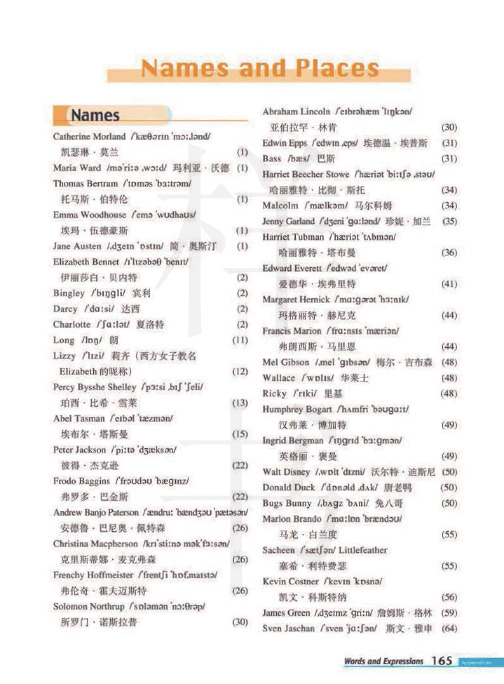
样 ø西奖德·蒙哥马军IJ
(78)
Anne Shirley læn 'J3:lil 安妮, gr和l
(78)
MariUa Cuthbert 1m3'口I~ 'k^9b3V
玛丽拉·卡思伯特
(78)
Walier J'w 0 It~1 沃尔特
(78)
Bcrtha J'b3:931 I1自莎
(78)
Thomas Chandler Halibunon J'lom3S 'uo:ndt3
Buffalo J'b^f~l~ul 布法 罗
罗伯逊·戴维斯
(82)
(羡国纽约西部的- 城市)
(54)
Timothy Pindley (um39i 'fmdlil
Vancouvcr Ivæn'ku:v~1 温哥华
导带奖酋 ·芬德和l
(82)
(加拿大城市)
(72)
Margarel Alwood !'ma:go:lrll 'ælwud!
Mount Ruapchu Iru~'pelhul 部阴佩胡火山 WeSI 1ndies l,weSI 'lßdlzl 西印度群岛 GCllysburg J'geuzb3: g/葛底斯堡( 虽是因
城市)
(21)
(23)
(23) (23) (39)
(41)
Robertson Davies !'rob~ts棚 'dclvlsl
(76)
(76)
(76) (77) (78)
m 利·布林克斯
(87)
{加拿大东部的 -个省)
(78)
- 1、下载文档前请自行甄别文档内容的完整性,平台不提供额外的编辑、内容补充、找答案等附加服务。
- 2、"仅部分预览"的文档,不可在线预览部分如存在完整性等问题,可反馈申请退款(可完整预览的文档不适用该条件!)。
- 3、如文档侵犯您的权益,请联系客服反馈,我们会尽快为您处理(人工客服工作时间:9:00-18:30)。
用
法
主句 -+as+ 从句 皿+从句. + 玉句
用撞楷倒
( ] ) The people cheered lhe soLdi巳rs as they march.ed past.
(2) As we were 1四.\ling, lhe suo caroc out.
斟+形等词 JWH司+据+名词/代 词 1 从句 1 形容词 常用于此句型中的自l 词~短语
样 书
样 书
样 书
样 书
样 书
样 书
样 书
样 书
样 书
样 书
样 书
样 书
样 书
晴用句型 固重用法
晴用句型 习惯描配 固定用法
带用句型
11.. Have got to
用遥
」
用法带倒
have I has + gOl +阳+ 动词原形
表示函、要性或不得不做某 m
( 1) They say l' y,e got to get a work pernlir.
样"-1". Never
国
浩
never 牛 街便句 名词 I{ti司+阻四11'+现在时牵动词
名词 If吃词+ ~s I a晤. elc +血ever
名词J 代词+胁动词 l 俯牵动词+
never +动词原~
用撞端恻
( 1) Never let chì1dren play wit& nlatches. (2) She never he[ps with lh巳 cooking. (3) Mary is ne'T'er Jate.
(2) What have )'0\1 got to do (his aftcrnoon?
you've got 阳 be joking I kidd ing | 表示不相信
- BiJ1y wants to be a baJJet dancer. -Yoll' ve got 10 be.j,oking!
( 1) J'vc flcver Butd lhis fruit bcforc.
(2) r Il never go bàck 由ere .agalß.
常和 nev町 连用的其恤词有 z 削y.
anylhing like
( 1) Jack nev町回归 any vegetables.
(2) Rain! r ve nev'er known anything like
有! almost, near[y. alleasl, jusl, twiçe, thr暗号 tilll白. half 哥
(1) 1ì町ry is nea:rly as tal1 as her brother.
(2) She swims. welJ咱 bUl 酬描 we]] as
you (do). 。 ) T11St gira吁'e ís al most a... taJ1as thc
i t.
never mj nd 表示不用担心
- The reslaurllñt is dosed. - Never l1lind. we' lI find another one.
书As Never again! 表示强剧的不椭或
失望
- [ went to the Interne:t bar once. -Never again.!
| E阳e. 刊佛阳仰T布 }内b师i拮s盯r阳叫盹…,t 阳 l lhc other 00囚e.
样 书
样 书
样 书
样 书
样 书
样 书
样 书
样 书
face when hc opcncd thc door.
名词/代词 +阳阳er+ 过去时态毒IJ饲 (2) I ncvcr said that.
never +助动词+主i吾+动词
市和 never if用的副 iir'有 :
befo阻.agam唰阳ally. even, once
Never had it wned so much ,
